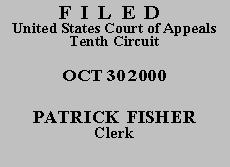

| LYNDA J. BINGHAM,
Plaintiff-Appellant, v. KENNETH S. APFEL, in his capacity as Commissioner of the Social Security Administration, Defendant-Appellee. |
|
Claimant Lynda J. Bingham appeals from the denial of social security disability and supplemental security income benefits. We have jurisdiction under 28 U.S.C. § 1291 and 42 U.S.C. § 405(g). We review the agency's decision on the whole record to determine only whether the factual findings are supported by substantial evidence and the correct legal standards were applied. See Goatcher v. United States Dep't of Health & Human Servs., 52 F.3d 288, 289 (10th Cir. 1995). We reverse and remand for additional proceedings.
Claimant was born in 1964 and is thirty-six years old now. She alleged a disability due to mental impairments, obesity, and other physical impairments. The ALJ denied benefits at step five of the evaluation sequence. See Williams v. Bowen, 844 F.2d 748, 750-52 (10th Cir. 1988) (discussing steps in detail). Claimant argues on appeal that the ALJ: (1) did not properly evaluate her mental impairments at step three; (2) erred in his assessment of her credibility; and (3) did not support with substantial evidence his finding at step five that she could perform work other than her past work.
Claimant has medical documentation of her mental impairments. See Appellant's App. at 159-66. The ALJ expressly accepted this evidence as "being based on objective signs and laboratory testing." Id. at 16. It shows that claimant's mental aptitude equals that of an eight-year-old to an eleven-year-old child, depending on what skill was being measured. See id. at 162. She also has numerous other mental problems, such as extreme impulsivity, severe problems getting along with supervisors and coworkers, inability to control her anger, defensiveness, insecurity, et al. See id. at 164. The psychologist had a "guarded" opinion that she would be employable if she received vocational rehabilitation and individual psychotherapy, considering her mental impairments and obesity. Id. at 165.
The ALJ made two legal errors with respect to this evidence at step three. First, in contravention of Clifton v. Chater, 79 F.3d 1007, 1009-10 (10th Cir. 1996), the ALJ did not specify which listings he reviewed at step three or discuss the evidence he accepted or rejected with respect to the requirements of those specific listings. Rather, as in Clifton, the ALJ simply stated that claimant did not meet the criteria of any listing. See Appellant's App. at 13. As this court stated in Clifton, "[s]uch a bare conclusion is beyond meaningful judicial review." 79 F.3d at 1009.
Second, the ALJ failed to follow the specific analysis for mental impairments required by the agency's regulations, as stated in Cruse v. United States Dep't of Health & Human Serv., 49 F.3d 614, 617 (10th Cir. 1995). Even though the ALJ completed a Psychiatric Review Technique Form (PRTF) and attached it to his decision, that is not enough. Rather, the ALJ was obligated to discuss in his decision the evidence as it related to his conclusions on the PRTF. "[I]f the ALJ prepares the form himself [instead of having a psychiatrist or psychologist do it], he must 'discuss in his opinion the evidence he considered in reaching the conclusions expressed on the form.'" Id. at 617-18 (quoting Washington v. Shalala, 37 F.3d 1437, 1442 (10th Cir. 1994)). The ALJ did not discuss the evidence of mental impairments, except in the most cursory fashion.
The only specific statement the ALJ made about this evidence, other
than accepting it as well-supported, was that he did not accept the psychologist's assessment of claimant's vocational limitations because of claimant's work evaluations in Exhibit 3D. See Appellant's App. at 16, 48-61. The ALJ's statement implies that her work evaluations were acceptable. However, the first page of Exhibit 3D shows that the evaluator would not have hired claimant if he had the decision to make that day. See id. at 48. The evaluator marked her performance as unacceptable on numerous items, including requiring excessive supervisory support, inability to complete work without prodding, poor quality work, inability to control herself and cope with annoyances at work, failure to punch in and out of work, inability to work as fast as coworkers, failure to show up at work each day, poor quantity of work output, lack of stamina displayed at work, and a poor attitude towards work and herself. See id. The whole of Exhibit 3D is a warning that claimant could be fired for poor performance. See id. at 48-61. It states that claimant had a limited amount of time to bring her performance up to par or she would be reassigned or discharged. See id. at 51, 54, 55. This evidence thus contradicts the ALJ's implied finding that claimant received acceptable evaluations at work, and does not provide a valid reason to reject the psychologist's assessment of claimant's vocational limitations.
Clifton and Cruse teach that the evidence must be analyzed by the ALJ in the first instance at step three. It is unnecessary to address claimant's other arguments.
The judgment of the United States District Court for the District of Utah is REVERSED and the case is REMANDED for additional proceedings.
Entered for the Court
Circuit Judge
*. This order and judgment is not binding precedent, except under the doctrines of law of the case, res judicata, and collateral estoppel. The court generally disfavors the citation of orders and judgments; nevertheless, an order and judgment may be cited under the terms and conditions of 10th Cir. R. 36.3.